|
For larger print text or to download, click the PDF file below.
Offered in the best of faith, but ...Throughout the year, the Southern New England Conference of the United Church of Christ produces the Daily Lectionary for use by churches. These are the suggested readings for Saturday, February 27th: Genesis 16:7-15; Psalm 22:23-31; and Mark 8:27-30. I would encourage you to read these short selections as part of your Lenten practice.
In today’s Marcan selection, we hear Peter profess that Jesus is the Messiah. In this original account, the one prior to all of Matthew’s emendations (which make perfect sense as the Jewish-Christian Gospel honours a Jewish-Christian advocate), there are no flourishes of praise for Peter. It would seem inappropriate to claim Peter’s profession as divinely revealed (cf. Matthew 16:17) since we will soon discover that what Peter means by “‘You are the Messiah’” is not what Jesus means by Messiah. One of the images used to understand Lent is to speak of it as a journey. “Lenten journey” is a commonly used phrase. It refers to the efforts of the faithful to approach ever closer to Christ, and especially to Christ crucified. This entails distinguishing our expectations from God’s because a crucified Saviour is startling unexpected. It means opening ourselves and making ourselves even vulnerable to God’s way rather than our own. A vital faith should encourage us to grow in the faith, to change, to leave aside our predilections in favour of God’s truths – even if these may make us uncomfortable. Peter professes that Jesus is the Messiah, but Peter’s image of the Messiah is inadequate to convey Jesus’ Messiahship. This is what we will dwell on together at worship tomorrow, this temptation to replace God’s way with our ways dressed-up in religious clothing. This is why the community of the church is such a blessing. Faith practiced in isolation may become an echo chamber where we reinforce what we already believe, and maybe as in the example of Peter what we believe is sincere but off base. Faith in a community brings out the shared truth that withstands the tests of tradition and community. We are asked to look at our faith and that of others from different perspectives to see what emerges. This is all part of our shared Lenten journey. And I invite you to join us tomorrow at 10AM. You are welcome to gather with us in the church building following proper protocols or you can send me an email ([email protected]) and I will send you the Zoom log-in. At that time, we will continue with this Gospel passage and see where it leads us together. Whoever you are and wherever you may be on your life’s journey, you are welcome to join us as Hatfield Congregational Church, United Church of Christ. If you’d like, here is the link to the Massachusetts Conference’s daily reading schedule: www.macucc.org/lectionary. "Those who passed by derided [Jesus] ..."Throughout the year, the Southern New England Conference of the United Church of Christ produces the Daily Lectionary for use by churches. These are the suggested readings for Friday, February 26th: Genesis 16:1-6; Psalm 22:23-31; and Romans 4:1-12. I would encourage you to read these short selections as part of your Lenten practice.
Today is our second Lenten Friday. All of Lent’s 40 days are opportunities to grow closer to a Saviour who was willing to die obscurely for people too often unmoved, but Lenten Fridays draw us in even more closely. Alexei Navalny or Aung San Suu Kyi are two current examples of persecuted individuals. They, however, have the eyes of the world upon them. They have people marching in their own countries on their behalf. They are not forgotten or ignored. Their suffering is in the spotlight, and this imparts dignity and poignancy to what they endure. Jesus, though, dies alone and rejected like most all who suffer the trauma of persecution. I am drawn to the stark simplicity of Mark’s style. In this earliest Gospel, there are no sympathetic faces for Jesus to look upon from the cross. Rather, there is the cold indifference of the Roman soldiers who have hammered nails through His body and who then beneath His cross gamble for who should get what piece of His clothing, His last and only earthly possessions. Worse than this indifference is the mockery offered by the very ones Jesus devoted His ministry to and for whom He was willing to suffer and die. Those who “passed by” (Mark 15:29) derided Him, but I imagine their act of simply passing by was a heavier burden to pay. Jesus was dying basically unnoticed as people went about their excited business to prepare for an upcoming celebration. Jesus’ persecution was not like that of Navalny or Aung San Suu Kyi. He was forgotten and ignored. And yet Jesus accepted the cross. His conviction was so deep-seated that Jesus would sacrifice Himself regardless of the reaction of others. His love for us is so ineffable that it exemplifies His teaching: “‘If you love those who love you, what credit is that to you? For even sinners love those who love them.’” (Luke 6:32) It is challenging to meditate upon Christ’s love for us as proactive, not responsive. Jesus doesn’t love us because we first love Him. Jesus loves us because He can do nothing less. And yet still today people choose to forget or ignore. On these Lenten Fridays especially, I ask that we think about the message of the Psalmist: “For [the Lord] did not despise or abhor the affliction of the afflicted; he did not hide his face from me, but heard when I cried to him.” Our suffering Saviour will never hide his face from any of us. Let us not hide our faces from Him. If you’d like, here is the link to the Massachusetts Conference’s daily reading schedule: www.macucc.org/lectionary. Same Jesus at Christmas and at CrossThroughout the year, the Southern New England Conference of the United Church of Christ produces the Daily Lectionary for use by churches. These are the suggested readings for Thursday, February 25th: Genesis 15:1-6, 12-18; Psalm 22:23-31; and Romans 3:21-31. I would encourage you to read these short selections as part of your Lenten practice.
You know it’s only been two months since Christmas. One of the challenges of the liturgical calendar is to move so quickly from the celebration of Jesus’ birth, to where we stand now in Lent, the season that focuses on Jesus’ death. Challenge, however, is not a dirty word. The proximity of our focus on Jesus’ Incarnation, and all the hope and wonder it brought into the world, when we celebrated that in Jesus God has become one of us in our full human nature, remains in place as we contemplate the mystery of the cross. The same Jesus who we acclaim as the Son of God at Christmas is the same Son of God who suffers and dies on Golgotha. We rejoice in Jesus’ human nature on Christmas, and it doesn’t fade or disappear on Good Friday. The abrupt change from Christmas two months ago to standing in the shadow of the cross today challenges us, and it challenges us to delve more spiritually and deeply into the mystery that Jesus in His full human nature and in His full divine nature is crucified. Some early Christians, the Docetists, were so offended by the thought of our Saviour’s actual suffering and death that they insisted it only “appeared” (δοκεῖν, dokein, Greek for “to appear) like Jesus was on the cross. They imagined that the real Jesus hovered over the cross and laughed at the human hubris that we could actually kill the Son of God. This heresy was beginning to emerge even before the New Testament was closed. Thus, we read in 1 Peter: “Now as an elder myself and a witness of the suffering of Christ …” (5:1) In 2 John, it is written: “Many deceivers have gone out into the world, those who do not confess that Jesus Christ has come in the flesh …” (vs.7) It was deemed necessary to reiterate the basic facts of Jesus’ human nature and His suffering because some wanted to honour the Christ by denying Jesus of Nazareth. The suffering death of Jesus Christ becomes a part of the nature of God in a mystery that we contemplate “with sighs too deep for words.” (Romans 8:26) The resurrected Jesus shows Thomas and the other disciples the crucifixion wounds that still scar His glorified flesh. The Saviour in heaven sees for eternity the nail prints in His hands and never forgets what it is to suffer as a human and never wonders about the divine love that allows for Jesus to suffer in that way. The challenge of the faith is to appreciate the depth and wonder of such a sacrifice, a sacrifice no one is worthy of, and everyone is worthy of: “For there is no distinction, since all have sinned and fall short of the glory of God; they are now justified by his grace as a gift, through the redemption that is in Christ Jesus, whom God put forward as a sacrifice of atonement by his blood, effective through faith.” The challenge is to believe in such an ineffable love, and not take advantage of it, but be inspired by it. If you’d like, here is the link to the Massachusetts Conference’s daily reading schedule: www.macucc.org/lectionary. The last temptation was powerThroughout the year, the Southern New England Conference of the United Church of Christ produces the Daily Lectionary for use by churches. These are the suggested readings for Wednesday, February 24th: Psalm 77; Proverbs 30:1-9; and Matthew 4:1-11. I would encourage you to read these short selections as part of your Lenten practice.
This evening at 7:00pm is the first talk in our 24th annual Lenten Discussion Series. The discussion will be led by Rev. James Koyama, the pastor of the Montague Congregational Church, UCC. His chosen topic is “Snow on the Deerfield River: Reflecting on Idols.” Rev. Koyama is also the one who suggested this year’s general theme of “Even the cherry blossom falls.” This is a Japanese proverb that urges us to cherish the fleeting beauty that we may encounter for but a moment. Take notice of the blessings of the moment and then cherish them after they have passed. Don’t dwell on their loss; concentrate on the gift that they are. A gift that was taken from us this past Friday was Sister Dianna Ortiz. She was an American nun who chose to serve in Guatemala during an extremely violent and savage period. She continued to teach indigenous Mayan children even after receiving repeated threats to her safety and life. Helping these children to learn was judged subversive. She was kidnapped, gang raped and tortured by men supported by the ruling military government, which in turn was supported by Sister Ortiz’s own government, the United States of America. She escaped miraculously and returned to our country, and here waged an incessant battle against state-sponsored violence. If all of this were not enough pain for one life, she died this past Friday in hospice care in Washington, D.C. She was only 62. The cause was cancer. https://www.nytimes.com/2021/02/20/us/dianna-ortiz-dead.html According to Matthew, Jesus’ last temptation is worldly power. Satan had left his most enticing offer for last. Rather than be a Saviour who would struggle against the powers of the world Jesus was tempted to save by becoming THE power in the world. Power is an alluring temptation and even Jesus realized it was too dangerous to try and control. What hope would simple humans have to control it? “Power tends to corrupt and absolute power corrupts absolutely. Great men are almost always bad men...” Thank God for the fleeting beauty and blessing of Dianna Ortiz who stood up to such power. A devoted follower of Christ, she cared for the outcasts and the forgotten, and she faced down the bruteness of uncontrolled power that saw such kindness as an evil. There is comfort in the hope of her continuing life in heaven, and inspiration in her example. May we, like Jesus and like Sister Ortiz, continue to find the courage and conviction in our faith to speak truth to power. If you’d like, here is the link to the Massachusetts Conference’s daily reading schedule: www.macucc.org/lectionary. Suffering is amoral. How we respond to suffering is moral.Throughout the year, the Southern New England Conference of the United Church of Christ produces the Daily Lectionary for use by churches. These are the suggested readings for Tuesday, February 23rd: Psalm 77; Job 5:8-27; and 1 Peter 3:8-18a. I would encourage you to read these short selections as part of your Lenten practice.
All three of today’s readings deal with suffering, whether the suffering is deemed deserved or not. Suffering is a universal condition. It is unavoidable. If you’re not too depressed today, because this article could push you over the edge if it’s a bad day, take a quick read of this interview with David Benatar who “may be the world’s most pessimistic philosopher. An ‘anti-natalist,’ he believes that life is so bad, so painful, that human beings should stop having children for reasons of compassion.” https://www.newyorker.com/culture/persons-of-interest/the-case-for-not-being-born Before any of us reject this philosophy automatically, we should know that there was a strand of early Christianity that professed basically the same aversion to procreation. Earliest Christians were a tiny minority among the peoples of the Roman Empire. The Empire seemed invincible and eternal. What hope did believers in Jesus have to overturn it and usher in the reign of Christ? Some proffered the teaching that the only way to facilitate Christ’s triumph in the world was to bring the world as they knew it to an end. The sexual mores of the Empire would be rejected in favour of the ascetism of sexual abstinence. Virginity exemplified morality’s highest paradigm. By preventing procreation, Christians would force Jesus to hasten His glorious return in power. They accepted this radical plan because they were so desperate to throw off the suffering of ordinary life. Whether the philosophy of the “anti-natalists” or the theology of the Christian ascetics, suffering is so burdensome and ubiquitous that some feel sentient life is by definition cruel and mercilessly painful. If you are a Bible reader, think to yourselves about what you have read, and sort casually in your mind how many passages are celebratory and how many, such as today’s, acknowledge justified or unjustified suffering. Which side weighs heavier? Is it even close? Suffering is amoral. Faith or faithlessness do not affect how suffering is dispersed. There is no such thing as a Prosperity Gospel. Faith is not a magical cloak that protects from suffering’s randomness. Think back to the statement in 1 Peter: “For it is better to suffer for doing good, if suffering should be God’s will, than to suffer for doing evil.” Either way, for doing good or for doing evil, suffering is a constant threat. But there’s another matter here that should not be overlooked. Suffering is universal, even Jesus suffered, says 1 Peter. Does this imply God’s feebleness? One has to wonder if this conclusion is being counter-balanced by the tidy addition of “if suffering should be God’s will.” Maybe the defender of faith realizes suffering’s amoral universality. Maybe faith can’t be defended as a bastion against suffering, but maybe it can be protected from the argument of God’s feebleness by claiming that the almighty God wills suffering. This is not God allows suffering, but God dictates suffering, is responsible for the suffering. This convenient addition protects God’s omnipotence, but it does so by brutalizing the very nature of God. How does one turn in faith to God in times of suffering, which are universal, if we are to believe that the same God has willed that suffering? If this is the case, then God may be strong, but also uncaring. The amorality of suffering has become theologized. In the Book of Job, Job and his companions struggle with the idea of suffering. The companions insist that Job’s suffering is merited and Job counters that it is unmerited. The book ends with no answer offered about human suffering. Probably because suffering is not a moral or theological issue (Dealing with it is and Job’s companions fail miserably at this). Suffering is a disinterested physical occurrence. Without an answer offered, God basically says to Job, “Who are you to challenge my ways?”, and Job is satisfied at the end of the book. It is facile to imagine that Job is satisfied by the replacements he receives for the lost ones he loved. Rather, the answer in the Book of Job seems to be that Job at least knows that God is and that God is aware. Job’s torment is assuaged by God’s self-revelation. To know that God is and to know that God is not casually uninterested in his suffering satisfies Job. Move this theology into the future of Jesus’ ministry as God’s presence in the suffering world, and especially to the cross where God in Jesus experiences the torment and fear of suffering, and the Book of Job’s argument is amplified to the point that, yes, suffering is real, but it is not willed by God – It is endured by God with us! This is at-one-ment, and for me at least this is more comforting than atonement. Suffering is an amoral, disinterested consequence of the real world, but “Do not fear what they fear, and do not be intimidated, but in your hearts sanctify Christ as Lord.” We can’t obliterate suffering. It is universal. We can in our hearts sanctify Christ as Lord by standing with those who do suffer. In this way we honour Jesus and especially His suffering and death. If you’d like, here is the link to the Massachusetts Conference’s daily reading schedule: www.macucc.org/lectionary. God's EternityThroughout the year, the Southern New England Conference of the United Church of Christ produces the Daily Lectionary for use by churches. These are the suggested readings for Monday, February 22nd: Psalm 77; Job 4:1-21; and Ephesians 2:1-10. I would encourage you to read these short selections as part of your Lenten practice.
I love inter-library loan. I recently picked up Black Hole Survival Guide by Janna Levin from the library. It’s a light, poetic, imaginary excursion to and into a black hole, a region of space-time so dense that nothing, not even light, can escape its gravitational pull. Even though it is impossible to retrieve any information from inside the black hole, some extremely intelligent people, like Janna Levin, can figuratively peer inside through their mind’s eye guided by the laws of physics and mathematics. Black holes are a logical – and real – consequence of Einstein’s Theory of Relativity. Einstein experienced an “aha moment” when he realized that there is no way to tell if you are in a windowless elevator freefalling to your death because a cable broke or if you are floating carefree in an elevator in space experiencing zero gravity. This eventually led to the idea of gravity warping spacetime. You may have seen images like the one below. The satellite orbiting the earth is actually in a freefall toward the earth because the space around the earth has been warped by the earth’s gravity. Space’s vacuum will allow the satellite to remain in this freefall of an orbit. This is how gravity acts on another object without actually making contact with it. When there is enough mass to create a black hole, however, spacetime is warped so catastrophically upon itself that it shuts itself off from the outside world. Nothing can escape. Last week we put a vehicle, and a helicopter, on Mars. That journey began when a rocket reached a high enough velocity to escape earth’s gravity, to fight its way out of the warped space around the earth. The gravity of a Black Hole is so immense that anything inside would have to reach an escape velocity greater than the speed of light, and that is impossible because the speed of light is Relativity’s single constant. Another astounding reality that Relativity reveals is that space and time are interconnected. The more mass the slower time moves; the less mass the faster time moves. If you lived in the Swiss Alps you age more quickly than if you lived at their base because you would be farther away from the earth’s center of mass. Speeding through space also plays such weird games. The faster your velocity the slower your clock. And both of these come into play with Black Holes. When it comes to Black Holes, the mass is so extreme that not only space, but time collapses upon itself. Time would seem normal to you as you approached the Black Hole, but to others at a distance your clock would appear to be moving glacially slow, and you would, because of Relativity, see their clocks moving at a comedic pace of fast-forward. As you passed the edge of the Black Hole, the event horizon, it would appear that your clock has frozen “as though your crossing of the event horizon takes an infinite time.” (p. 61) This is because space and time are united and everything in the Black Hole is moving at the speed of light, and at this speed time stops. Correspondingly, as you look out past the event horizon you could see eons of time pass by as if they were but moments of seconds. Levin writes that we cannot see into a Black Hole, but from the inside you could look out. Black Holes are extraordinary but not few in number. Say there are hundreds of billions of galaxies in our universe or even a couple of trillion. Black Holes may lurk at the center of most all of them, as one does at the center of our galaxy. We think of time as ordinary and consistent, but it isn’t. And this is a physical, testable reality. For me at least, this makes God’s eternity not seem so outlandish. The Psalmist today touches upon the forever of God: “‘Will the Lord spurn forever, and never again be favourable? Has his steadfast love ceased forever? Are his promises at an end for all time? Has God forgotten to be gracious? Has he in anger shut up his compassion?’” This may have been written during a particular time of nation upheaval. Israel may have imagined that God had changed forever, but God has not forgotten His promises. They were not “at an end for all time.” One of Lent’s lessons may be to try and see our lives and our world, at least occasionally, through God’s perspective. Maybe we could then trust God more firmly so that even when we ask, “Why, God?” we could still give God the benefit of the doubt. To have faith is not to be free from the Psalmist’s angst. It is to rise above it. Faith lets us join with the author of Ephesians and believe: “But God, who is rich in mercy, out of the great love with which he loved us even when we were dead through our trespasses, made us alive together with Christ—by grace you have been saved— and raised us up with him and seated us with him in the heavenly places in Christ Jesus, so that in the ages to come he might show the immeasurable riches of his grace in kindness towards us in Christ Jesus.” If you’d like, here is the link to the Massachusetts Conference’s daily reading schedule: www.macucc.org/lectionary. Polarization? Not around Jesus.Throughout the year, the Southern New England Conference of the United Church of Christ produces the Daily Lectionary for use by churches. These are the suggested readings for Saturday, February 20th: Psalm 25:1-10; Psalm 32; and Matthew 9:2-13. I would encourage you to read these short selections as part of your Lenten practice.
If you click on the link to the Boston Globe article, you will see on the chart that Americans are about in the middle of the pack among Western Democracies when it comes to political polarization. https://www.bostonglobe.com/2021/02/10/opinion/us-is-less-polarized-than-you-might-think/ The problem, however, is that the rate of polarization is increasing more rapidly here than in those other countries. Polarization is abetted by separation and tempered by contact. If you visit our FaceBook page and scroll down a bit, you will see a link to an article in The Recorder about a group that brings together the conservative-leaning people from the Appalachian areas of Kentucky with the progressive-leaning residents of our local town of Leverette. They are proving in real life the theory about polarization. When people get to know one another rather than create caricatures of each other, they realize that we have so much more in common than would be imagined. Friendships have been made among people who are on completely opposite ends of the political spectrum. Where polarization should have been rampant, relationships formed instead. Think about today’s Gospel. Up to this point in Matthew, Jesus has called four Galilean fishermen as disciples. Today Jesus calls a tax collector. Without going into it, I imagine you have heard the explanation before, Jews who worked for the Roman Empire collecting the taxes that paid for the occupying forces to remain in Israel were not well liked to say the least. And yet Jesus brings together Galilean fishermen and a tax collector in that tight knit group of disciples. I imagine it may not have been comfortable for the fishermen to share food with the tax collector and his kind, but there they were in Matthew’s home breaking bread with “tax collectors and sinners.” Do you remember one of the final scenes of the movie Patton with George C. Scott? Do you remember the festive dinner the Soviets threw upon the defeat of the Nazis, and Patton and the Americans sitting there with scowls on their faces refusing to participate? I wonder if that’s the same look the fishermen-disciples had on their faces in Matthew’s house. Here’s the funny thing. The Pharisees see this – Jesus sitting with an unsavory sort and maybe the disciples sitting like the Americans in Patton. Thinking they may have a sympathetic ear with the disciples, the Pharisees ask them why Jesus associates with such people as “tax collectors and sinners.” Jesus hears the question, which begs another question. Just where were the Pharisees when they made their inquiry if Jesus was able to hear? Don’t we have to assume that the Pharisees are also in Matthew’s house? Are they even daring to sputter in contempt of “tax collectors and sinners” between bites of free food? How else could the Pharisees have asked the disciples their question since Matthew writes: “… were sitting with [Jesus] and his disciples”? Compare the example of the Pharisees with Jesus’ deliberate effort to bring polarized opposites together. It may have been uncomfortable, but the Galilean fishermen were sitting at table with the tax collectors of the Romans, and the fishermen would soon be joined by Matthew the tax collector as disciples in that intimate circle around Jesus. Jesus is beginning to create a community where everyone is respected for who they are not what others claim they must be. The disciples had to look past their assumptions of each other and see the person … and Jesus’ church began to form. I invite you to join us in worship as Jesus’ church tomorrow morning for the First Sunday of Lent. We are proudly “Open and Affirming,” which means that honestly and sincerely “Whoever you are, you are welcome at our church.” You can join in person at the church building or join as most are doing at present by worshiping online. Drop me an email ([email protected]) and I will send you the log-in link for the worship Service. Polarization is increasing in our country. Let’s continue what Jesus started at Matthew’s house so long ago by coming together in spite of our differences as we gather around Jesus. If you’d like, here is the link to the Massachusetts Conference’s daily reading schedule: www.macucc.org/lectionary. |
NewsFaith, love and chitchat. Categories
All
Archives
June 2024
Follow
|
||||||
|
SERVICE TIMES
Sunday 9:30-10:30am Children Sunday School 9:30-10:30am Nursery care available during worship DONATE Make a single or recurring contribution by clicking here |
FOLLOW
|
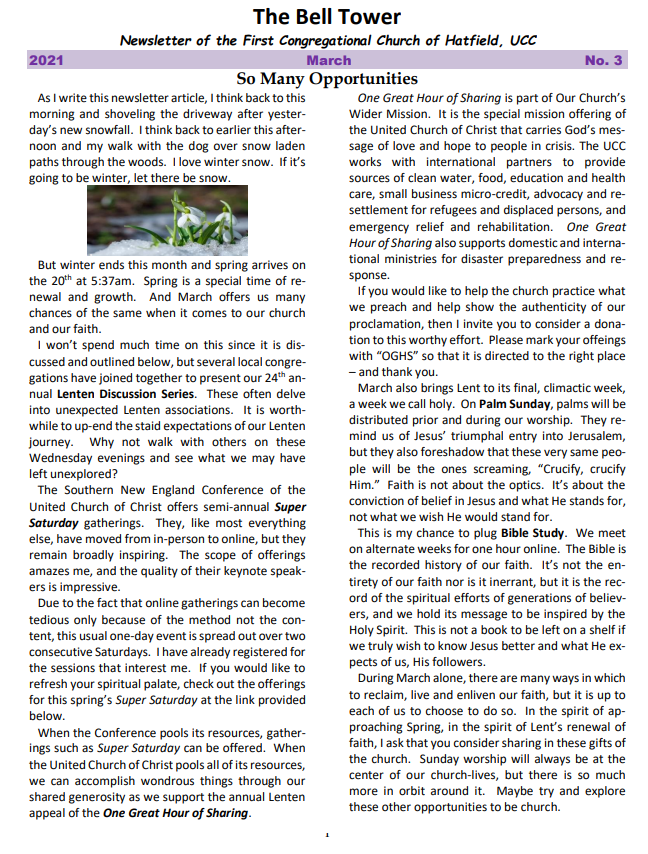
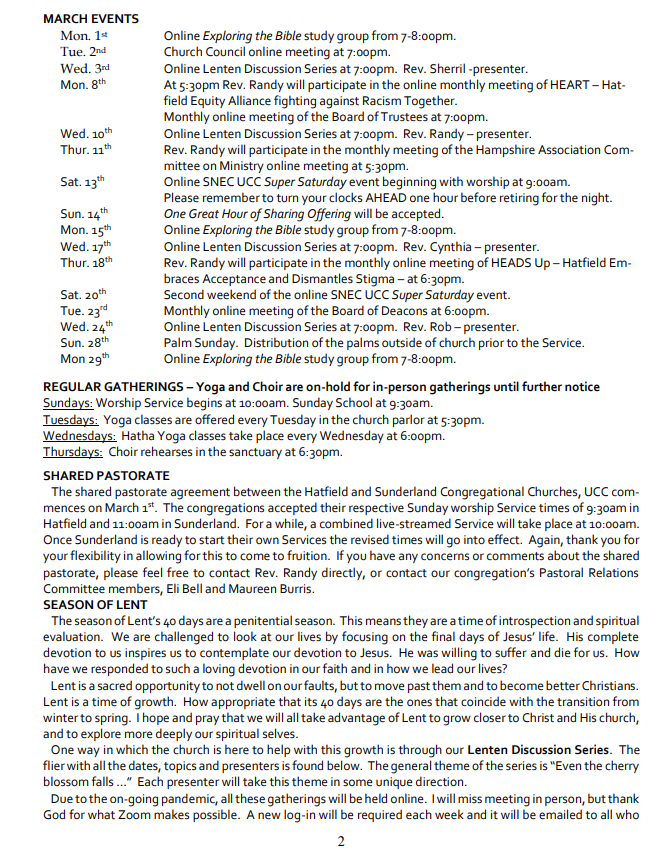
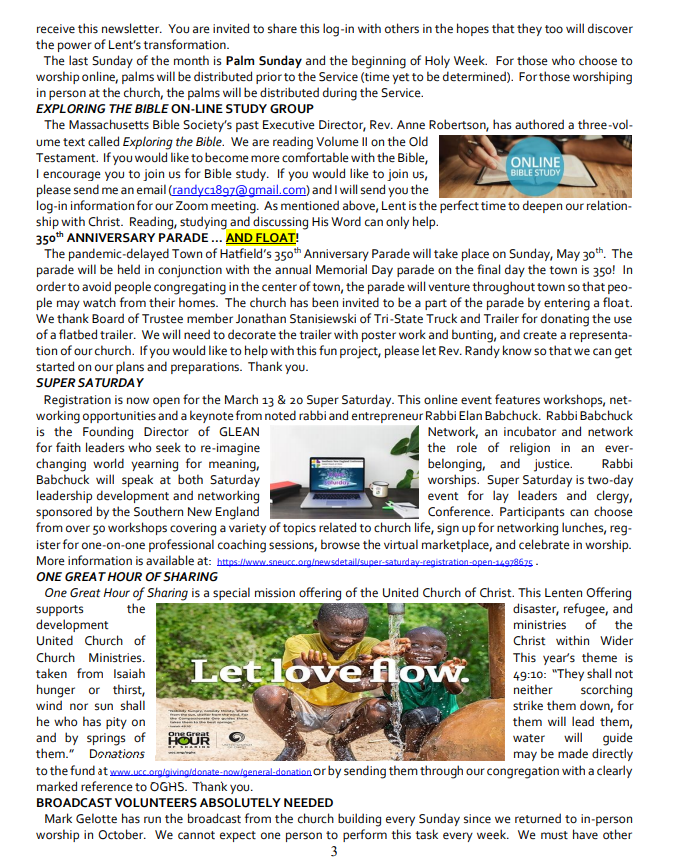
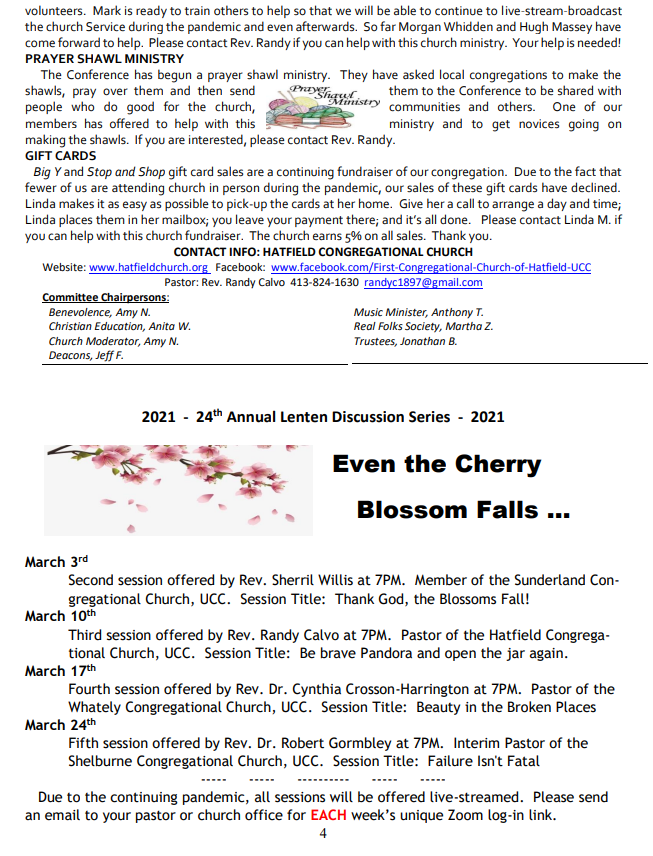
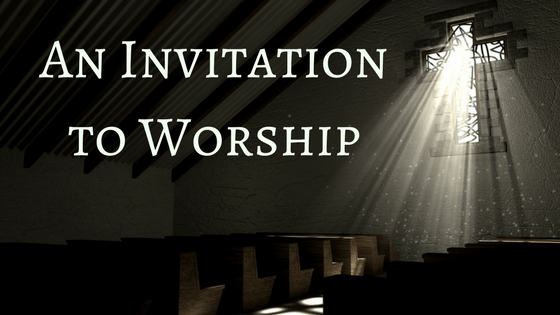





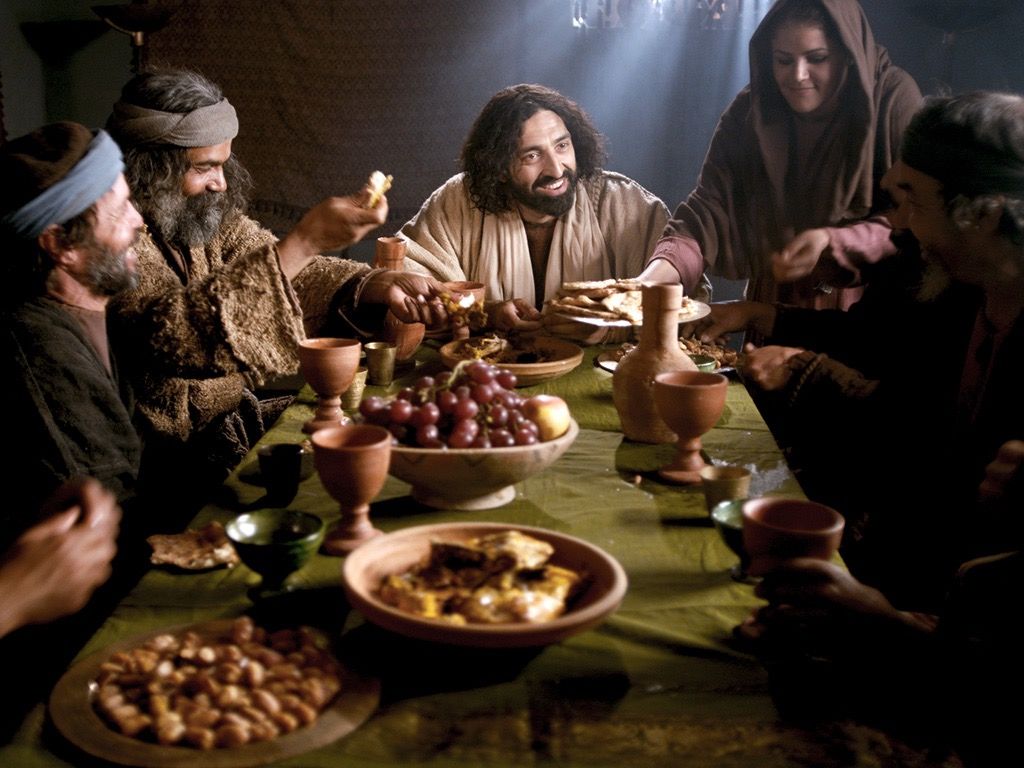
 RSS Feed
RSS Feed
